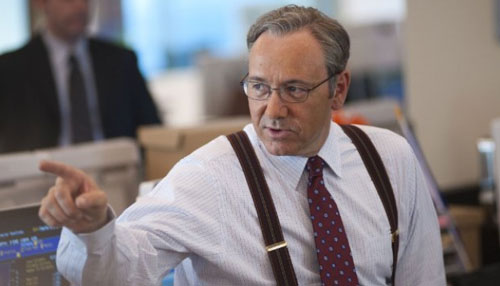
Money is just “pieces of paper with pictures on it so we don’t have to kill each other just to get something to eat”, declares Jeremy Irons as the reptilian CEO John Tuld in Margin Call, a drama about a group of investment bankers who have just realised that their game is up. It goes without saying that Tuld will do whatever it takes to protect his stack of cash.
Though his time on screen is relatively brief, he is the presence that dominates Margin Call, a nuanced look at events that unfold when an investment banking firm realises that the maths behind mortgage-backed securities no longer adds up. Greed may not be not good, the film suggests, but it is inevitable.
Margin Call opens as the firm begins a round of layoffs that is not the first in its history. Among those to be sent home with a pink slip is the head of risk, Eric Dale (played by Stanley Tucci), who is on the verge of discovering a fatal flaw in the complex financial instruments the firm trades.
He hands his incomplete work to young analyst, Peter Sullivan (Zachary Quinto). Sullivan’s brow furrows beneath his improbably bushy eyebrows when he discovers that trading is testing uncomfortable levels of volatility at a time that the firm is sitting on a pile of toxic assets. The upshot is that the company could go bankrupt if it doesn’t offload its paper before it dawns on the rest of the market that most institutions have large sums of money tied up in shaky investments.
Sullivan calls in his boss, Will Emerson (Paul Bettany), who in turn calls his boss, and so on, up the chain of command up to Tuld, whose name not coincidentally rhymes with Fuld, as in the boss of Lehman Brothers.
Meeting in the early hours of the morning before markets open, they conceive of a desperate plan that should save the firm from disaster at the cost of plunging the economy into chaos. The few that have ethical qualms about the plan are quickly bludgeoned into submission and cajoled into agreement.
Margin Call is the first film from commercial director JC Chandor, who directed and produced from a script he wrote. His father was an investment banker with Merrill Lynch for 40 years, so he is at ease with the jargon (that said, there doesn’t seem to be an actual “margin call” in the film) and familiar with the testosterone-fuelled world of trading.

Many critics have compared Margin Call to the work of David Mamet. They see in the film an Armani version of Glengarry Glen Ross, Mamet’s great play and film about the tattered morals and threadbare dreams of a group of scruffy real-estate salesmen. Talky but taut, the script bristles with the foul-mouthed machismo that Mamet is famous for.
Sentences are clipped off in the air, words trail off into ellipses and the characters rationalise and equivocate to deceive themselves as much as anyone else. The dialogue is brittle and precise. Phrases and motifs rhythmically repeat themselves as the characters try to persuade each other to jump on top of the bomb that is about to go off — or at least to help throw it out the window onto the crowded street below.
These investment bankers aren’t likeable, but they are human. Some of them are almost decent at heart. They even have pets that they love. But they work in a corrosive atmosphere of corruption that makes it hard for them to act according to their better natures.
It is a system where doing the right thing always comes at the cost of self-preservation and where avarice and short-sightedness seem to pay. There is something wrong with a world, hints Chandor, where rocket scientists or engineers are rewarded more handsomely to perform financial voodoo for investment banks than they are to build spacecraft and bridges.
A running gag in Margin Call is that the further you move up the hierarchy the less the person will understand about the maths. Sullivan’s direct boss exhorts him to “simplify”. Others ask him to explain the implications in plain language, until the man at the top asks him to explain the problem as he might to a child or a golden retriever.
The point isn’t that they are stupid. Rather, it is that it takes a mathematical genius to comprehend the numbers that underpin intricate instruments such mortgage-backed securities — and then imperfectly. But despite the voodoo, the markets follow the most basic and immutable law of physics: what comes up, must come down.
Margin Call has a sheen to it that belies its tiny budget of just US$3,5m, with cinematography, performances and set interiors that put many more expensively made films to shame. It leans heavily on the performances from the excellent cast that mixes up-and-coming talent with veterans such as Demi Moore and Paul Bettany.
Margin Call trailer (via YouTube):
Quinto, as the super-bright Peter Sullivan, and Penn Badgley, as a naïf with dollar signs in his eyes, both acquit themselves well, but the film belongs to its supporting actors. Irons wolfs down his few scenes as the predatory Tuld with gusto, making of him a corporate sociopath who would eat Gordon Gekko up for breakfast. Tucci is superb as a man bemused that the axe should fall on his head.
Kevin Spacey, who delivers a sour pep talk worthy of comparison to Alec Baldwin’s “Always Be Closing” speech in Glengarry Glen Ross, turns in his best performance in many years. As middle-aged senior manager Sam, he embodies the world-weariness of an ethically compromised man who sold his soul to the devil piece by piece.
Margin Call’s most glaring fault is the occasional trite metaphor. Your eyes may roll at the obviousness of a scene where Bettany’s cynical, reckless trader teeters on a rail on the roof of a skyscraper. Some viewers may find the film a little stagey. Yet Margin Call is tense, engrossing and intelligent. It’s a superior look at the subprime crisis to Oliver Stone’s bloated Wall Street 2. — Lance Harris, TechCentral
- Subscribe to our free daily newsletter
- Follow us on Twitter or on Google+ or on Facebook
- Visit our sister website, SportsCentral (still in beta)




